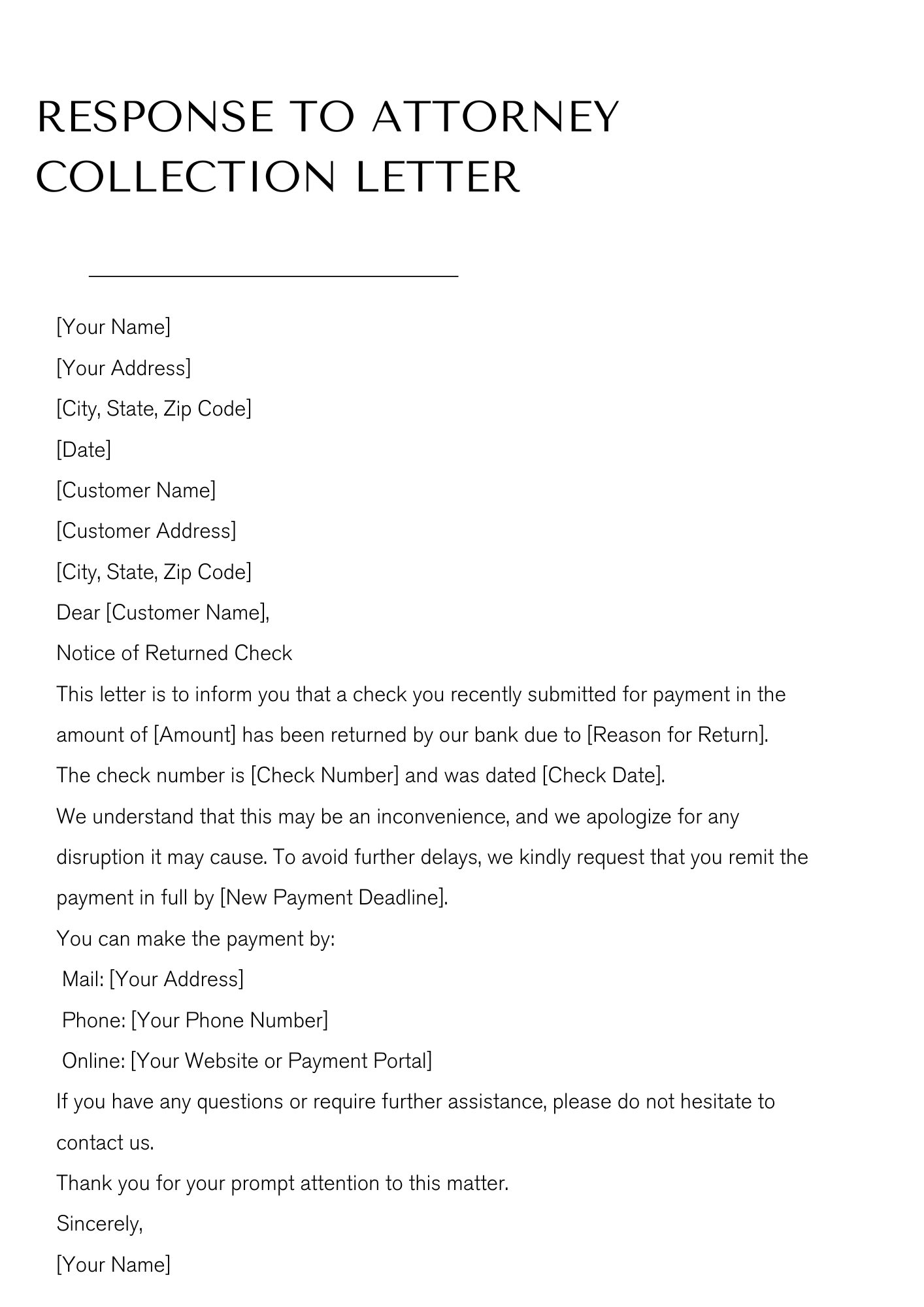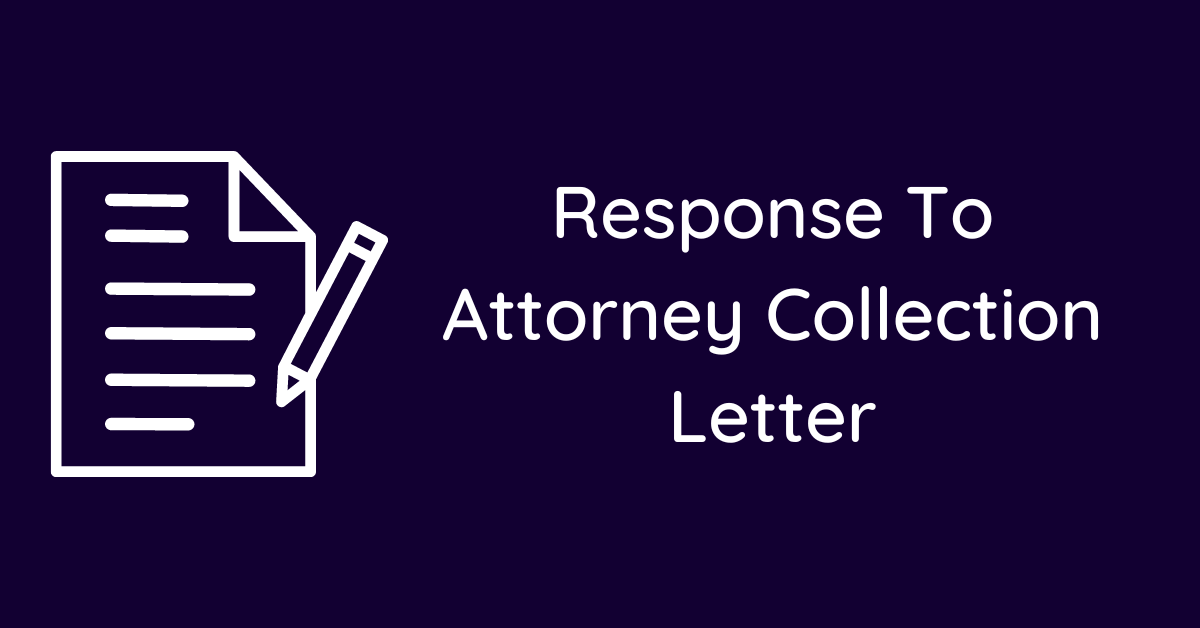If you have received an attorney collection letter, it means that a creditor has hired a lawyer to collect a debt that you owe.
The purpose of the letter is to demand payment and threaten legal action if you do not pay.
In this article, we will provide you with templates, examples, and samples of response to attorney collection letters. These letters will help you to negotiate with the creditor and avoid legal action.
The samples that we will provide are easy to use and can be customized to fit your specific situation. We will also provide you with tips on how to write an effective response letter.
Response to Attorney Collection Letter
Dear Attorney [Attorney’s Name],
I am writing in response to your collection letter dated [Date]. I understand that I owe [Amount] to [Creditor’s Name]. I apologize for the delay in payment and would like to explain my situation.
I have been experiencing financial difficulties due to [Reason for Financial Difficulties]. I have lost my job, and I am currently struggling to find new employment. I have also had unexpected medical expenses.
I am committed to paying my debt and have already taken steps to improve my financial situation. I have reduced my expenses and am actively seeking employment. I am confident that I will be able to repay my debt in full once I secure a new job.
In the meantime, I would like to request a payment plan that I can afford. I am willing to make monthly payments of [Amount] until the debt is paid off. I believe this is a reasonable request given my current financial situation.
I understand that you are representing [Creditor’s Name] and that your job is to collect the debt. However, I would appreciate it if you would consider my request for a payment plan. I am committed to resolving this matter and would like to avoid any further legal action.
Thank you for your time and consideration.
Sincerely,
Sample Response To Attorney Collection Letter
Dear Mr./Ms. Attorney,
I am writing in response to your collection letter dated [Date]. I acknowledge the outstanding balance of [Amount] on the account referenced above.
I understand the seriousness of this matter and am committed to resolving it as soon as possible. However, I am currently experiencing financial hardship that has made it difficult for me to make payments on time.
The following factors have contributed to my financial situation:
[List of specific financial difficulties, e.g., job loss, medical expenses, unexpected expenses]
I have been actively seeking ways to improve my financial situation and have taken the following steps:
[List of actions taken to address the financial hardship, e.g., seeking employment, reducing expenses, negotiating payment plans]
I am confident that I will be able to overcome these challenges and bring the account current as soon as possible. I propose the following payment plan:
[Outline the proposed payment plan, including the amount and frequency of payments]
I am willing to provide additional documentation to support my financial hardship, if necessary. I am also open to discussing alternative payment arrangements that may be more feasible for me.
I understand that this is a time-sensitive matter and am eager to resolve it amicably. I request your cooperation in considering my situation and working with me to find a mutually acceptable solution.
Thank you for your attention to this matter. I look forward to hearing from you soon.
Sincerely,
[Your Signature]
Responding To Debt Collection Letter
Dear [Debt Collector’s Name],
I am writing in response to your letter dated [date] regarding an alleged debt of [amount] from [creditor’s name].
I dispute the validity of this debt for the following reasons:
I have not received any prior notice or communication about this debt.
The amount claimed is incorrect.
The statute of limitations has expired on this debt.
I have already paid this debt in full.
Please provide me with the following information to verify the validity of this debt:
A copy of the original contract or agreement that created the debt.
A statement of account showing the balance due and any payments made.
Proof that you are authorized to collect this debt on behalf of the creditor.
Until I receive this information, I am unable to acknowledge or accept this debt as valid.
Furthermore, I request that you cease all collection efforts until this matter has been resolved. Any further contact from your office will be considered harassment and will be reported to the appropriate authorities.
I am willing to cooperate with you to resolve this matter amicably. However, I will not be bullied or coerced into paying a debt that I do not believe I owe.
Please contact me at [your phone number] or [your email address] to discuss this matter further.
Sincerely,
[Your Signature]
Response Letter To Collection Agency
Dear [Collection Agency Contact],
I am writing in response to your letter dated [Date] regarding the alleged debt of [Amount] for [Creditor Name].
I have reviewed the account information provided and dispute the validity of this debt for the following reasons:
Lack of Proof: You have not provided any documentation to support the existence of this debt, such as a signed contract or invoice.
Inaccurate Information: The account information you have provided contains errors, including [List of errors].
Statute of Limitations: I believe that the statute of limitations for this debt has expired. In [State], the statute of limitations for debt collection is [Number of years].
In light of these disputes, I request that you:
Cease all collection efforts immediately.
Provide documentation to support the validity of this debt.
Correct the inaccurate information on my account.
Verify the statute of limitations for this debt.
If you fail to provide satisfactory responses to my disputes within [Number] days, I will consider this matter resolved and will not acknowledge any further communication from your agency.
I understand that you have a responsibility to collect debts, but I will not allow my credit to be damaged by inaccurate or invalid claims. I am committed to resolving this matter fairly and amicably.
Thank you for your attention to this matter.
Sincerely,
[Your Name]
Response To Attorney Collection Letter Template
Dear Mr./Ms. [Attorney’s Name],
I am writing in response to your collection letter dated [Date of Letter]. I am aware of the outstanding balance on my account and I take full responsibility for the debt.
I understand that I am legally obligated to repay the debt and I am committed to doing so. However, I am currently facing some financial difficulties that have made it challenging for me to make the full payment at this time.
I am currently exploring various options to resolve my financial situation and I am confident that I will be able to make arrangements to repay the debt in a timely manner. I am open to discussing a payment plan that is both fair and reasonable.
I would like to request a meeting with you to discuss my situation further and explore possible payment options. I am available to meet at your convenience.
In the meantime, I would like to propose making a partial payment of [Amount] by [Date]. This payment will demonstrate my good faith and commitment to resolving the debt.
I understand the importance of resolving this matter amicably and I am eager to work with you to find a mutually acceptable solution. I appreciate your understanding and cooperation.
Thank you for your time and consideration.
Sincerely,
[Your Signature]

How to Write a Response to an Attorney Collection Letter
Receiving an attorney collection letter can be a stressful experience. However, it is important to remain calm and respond promptly. By following these steps, you can effectively dispute the debt and protect your rights.
1. Understand the Letter
Carefully read the letter to understand the amount of debt, the creditor’s name, and the attorney’s contact information. Identify the basis for the debt, such as a contract or invoice.
2. Gather Evidence
Collect any documentation that supports your position, such as proof of payment, a cancelled check, or a dispute letter you sent to the creditor. Organize these documents chronologically.
3. Draft Your Response
Use a professional and respectful tone. State your name, address, and contact information at the top of the letter. In the body, clearly state that you dispute the debt and provide your reasons. Cite specific evidence to support your claims.
4. Request Validation
Under the Fair Debt Collection Practices Act (FDCPA), you have the right to request validation of the debt. This means the creditor must provide you with a written statement that includes the amount of the debt, the name of the creditor, and the date the debt was incurred.
5. Negotiate a Payment Plan
If you acknowledge the debt but cannot pay it in full, propose a payment plan that you can afford. Be specific about the amount and frequency of payments.
6. Seek Legal Advice
If you are unable to resolve the dispute on your own, consider consulting with an attorney. An attorney can review your case, advise you on your rights, and represent you in court.
7. Send Your Response
Send your response to the attorney’s office via certified mail with a return receipt requested. Keep a copy of your letter and all supporting documentation for your records.
FAQs about Response To Attorney Collection Letter
What should I do if I receive a collection letter from an attorney?
It’s important to take prompt action. Contact the attorney immediately to discuss your situation and explore possible payment options.
What information should I include in my response?
Provide your full name, address, contact information, and account number. Clearly state your position regarding the debt, whether you dispute it or acknowledge it.
What are my options for responding to the letter?
You can pay the debt in full, negotiate a payment plan, dispute the debt, or seek legal advice.
What are the consequences of ignoring the letter?
Ignoring the letter can result in further legal action, such as a lawsuit or wage garnishment.
What if I can’t afford to pay the debt?
Contact the attorney to discuss payment options that fit your financial situation. You may be able to negotiate a reduced payment plan or seek financial assistance.
Letter To Lawyer Requesting Refund ( 5 Sample)

